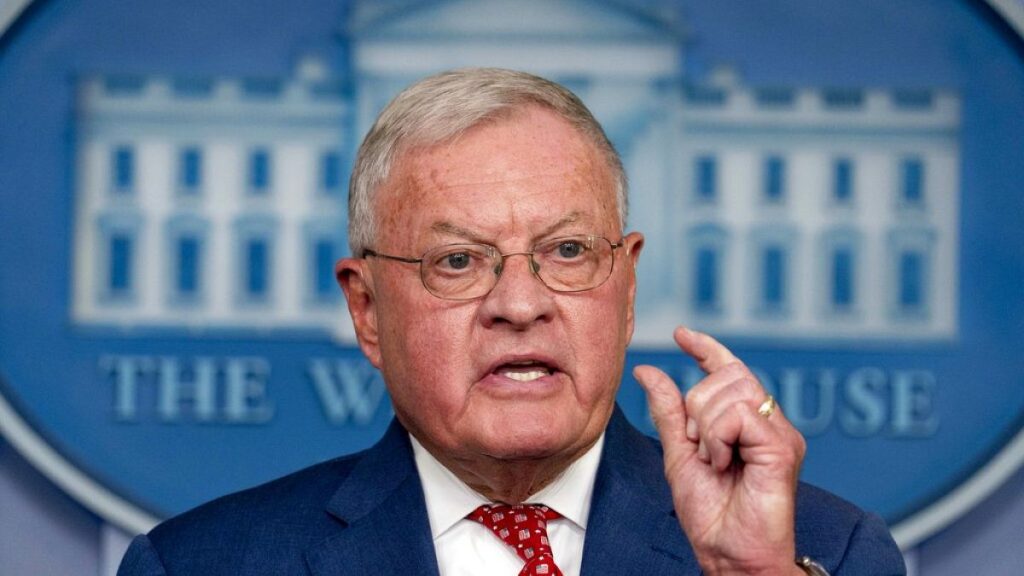In July 2023, General Keith Kellogg, nominated by then-President-elect Donald Trump as the special envoy for Ukraine and Russia, expressed robust support for equipping Ukraine in its war against Russia. Kellogg firmly defended the U.S. decision to supply cluster munitions to Ukraine, stating, “When you make the decision to support a nation at war, give all of the means necessary to finish it,” and emphasized that a comprehensive support strategy is crucial for Ukraine to ensure victory. As the war enters its third winter, Kellogg’s nomination raises questions about his stance on potential peace negotiations with Russia and his ability to navigate between supportive U.S. engagement with Ukraine and the pressures for a ceasefire.
Kellogg and fellow advisor Frederick H. Fleitz previously put forth a controversial plan that would curtail military aid to Ukraine if the country did not agree to negotiate with Russia. This plan included proposals to freeze current front lines and take Ukraine’s NATO membership off the table, coupled with a warning to Moscow that refusal to engage in talks would result in increased U.S. support for Ukraine. Kellogg shared his vision for ending the conflict in an interview, suggesting that the U.S. must continue to provide defensive support to deter Russian aggression during negotiations while also delaying Ukraine’s NATO accession in exchange for security guarantees.
The notion of Ukraine’s NATO membership has often been cited as a significant factor in Russia’s decision to invade Ukraine in early 2022. Kellogg warned that pushing for Ukraine’s accession to NATO could hinder peace efforts, leading to a situation where the war ends without a clear military victory, leaving some territories occupied by Russian forces. He argued that rushing NATO membership would threaten U.S. military engagement with Russia, complicating diplomatic efforts and risking a prolonged conflict. This perspective is rooted in Kellogg’s belief that the current war dynamics could result in a stalemate, which, instead of achieving decisive outcomes, might lessen the chances of a constructive ceasefire.
In a recent interview, Kellogg reiterated the need for the U.S. to challenge Russia’s posturing, specifically regarding their missile attacks on Ukrainian cities. He suggested that such actions are meant for psychological warfare, intended to intimidate the West. Kellogg stressed the importance of leaning into conflicts rather than retreating, expressing confidence that Putin would avoid a direct nuclear confrontation in Europe. He called for a strong reminder to Russia about the nuclear capabilities of Western allies, insisting on the need for clear deterrence strategies to dissuade Russia from crossing critical thresholds in escalating violence.
Kellogg’s approach reflects a broader geopolitical view of conflicts where the U.S. must navigate multiple adversarial states simultaneously, including North Korea and China, to prevent any sparks that could lead to World War III. His stance implies a careful balancing act of supporting Ukraine’s sovereignty while also managing U.S. engagement with Russia and maintaining international stability. The interdependence among adversarial nations underscores the complexities of modern warfare and diplomacy, particularly as systemic threats from powerful authoritarian regimes emerge concurrently.
In summary, General Keith Kellogg’s nomination by Donald Trump reflects a strategic shift in U.S. diplomacy toward Ukraine amidst an ongoing war with Russia. Kellogg’s insights on military support, peace negotiations, NATO membership, and nuclear deterrence provide a lens through which the U.S. can view its role in global security. His strong advocacy for equipping Ukraine combined with a cautious approach to negotiations encapsulates the challenges facing the incoming administration as it seeks to navigate a multifaceted and volatile international landscape while preserving its alliances and deterring adversarial aggression. The future of U.S. involvement in Ukraine hinges upon effective negotiation strategies, deft diplomatic engagements, and sustaining national as well as regional security in this tumultuous era.














